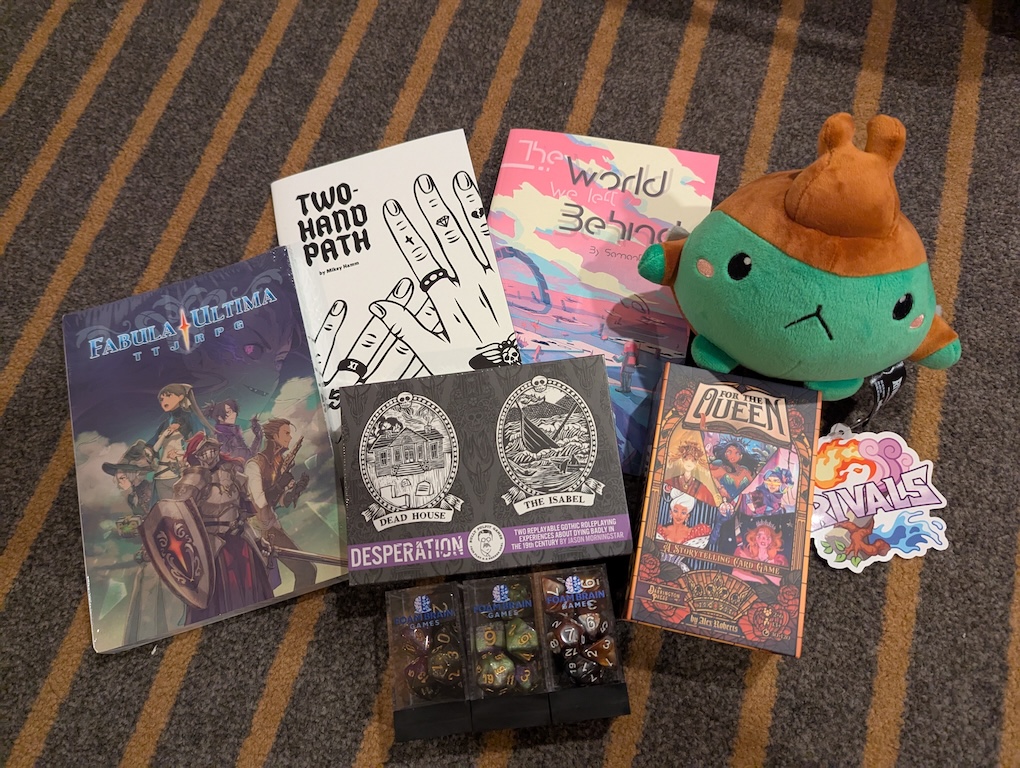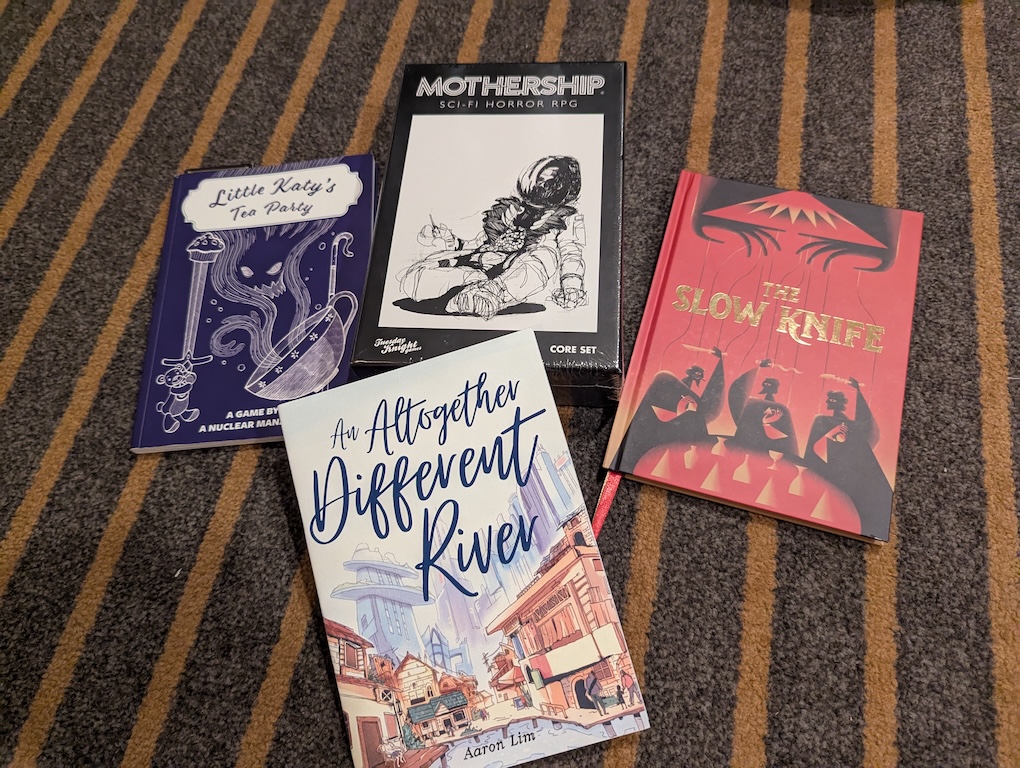
Well, here it is. I’ve finally attended a single event that spans both of the two key interests that I write about on this blog. PAX West is a video game expo, first and foremost, but it harbors a healthy (and, as far as I understand, growing) collection of tabletop and board game events and spaces. My partner and I spent two days exploring PAX and a couple more exploring other parts of Seattle.
Here’s a quick roundup of the things I played and, yes, the shopping I did.
Games I Played (Plus a Panel)
For the sake of the argument, I’m counting the couple of games that I watched my partner play. Here's the roundup:
Arcane Eats (Video Game)
Arcane Eats is a roguelike deckbuilding game about feeding various fantasy meals to various fantasy customers. There are a ton of games in the deckbuilding genre nowadays and it’s hard to stand out, but this one was cute and made a positive impression on my partner, whom I watched play it. She said that she appreciated the management angle to the encounters and saw some hidden depths in the deckbuilding even from a quick demo. Personally, I also liked that it was a game that wasn’t about combat, but also wasn’t going out of its way to be cloyingly “cozy”.
Fantasy Fantasy Football (Video Game?)
These folks are working on building a sort of meta card game around actual fantasy football, using actual football stats. It’s kind of absurd and it’s certainly ambitious from a design and balance perspective, but I can see the appeal almost instantly. You could get a lot of mileage you out of building deliberate meta-mechanics on top of fantasy sports scoring. Hell, fantasy sports scoring rules are already a rabbit hole of their own. I can’t really say whether this game will be for me, but it’s totally for someone.
Truckful (Video Game)
The developer demoing Truckful asked me “have you played Dredge? It’s like that, but on wheels.” It's a game about driving a truck with finicky controls along roads full of various obstructions, while periodically loading and unloading cargo into the truck bed. Its certainly not easy despite being very simple. I found it a little bit plodding, but it may be that it just doesn’t demo well at the scale that I played; after all, the game's store page alludes to an eldritch mystery to unravel.
Rivals of Aether II — New Character (Video Game)
I’ve recently been mildly obsessed with Rivals of Aether II, the indie Super Smash Bros. clone that has wonderfully functional online features and a tight roster of characters with deep and diverse kits. The upcoming new character, Galvan, has been described, quite literally, as a sequel to an existing one (Kragg) who’s already my favorite. I didn’t get too much time to experiment and I haven’t figured him out even a little, which suggests that his kit will be somewhat elaborate and very fun to learn.
Triangle Agency (TTRPG)
Triangle Agency is a game of corporate horror about regular people who are plucked out of everyday life (after a brush with the supernatural) and employed by a powerful and secretive organization to keep those supernatural forces in check. It takes cues from SCP, the X-Files, and (most familiar to me) the video game Control. Most of what I’ve heard about it is about how its rules text puts details behind “playwalls”, in which in-game milestones must be reached before more of the book is “unlocked”. This phenomenon both discourages and (subtly, in an act of rebellion) invites a would-be GM or player to read ahead. I’ve not looked closely at the book, so I can’t really opine on that yet, but I did have an interesting first-time play experience.
My partner and I played together with a group who were (I believe) all new players of game, but with varying familiarity. We had a reasonably good time with it, but I found the game clumsy to teach in a convention setting. It leans heavily on multifaceted character concepts and multiple pages of instruction text that go along with it, evocative of overbearing corporate paperwork in a way that might land better in a longer form game. The GM (a volunteer, and one running multiple games) had a packet of materials available for him to run the game out of, but it still wound up being clumsy in a lot of major ways. As with most decent tables we found our way to fun and success without too much trouble, but I came away understanding the game itself less than I hoped. Still, it was an encouraging dip of the toe into a somewhat elaborate game with some interesting push-and-pull mechanics that govern its flow. I’d like to get a closer look at it and I’d certainly consider bringing it to a table at some point.
Demonschool (Video Game)
Demonschool is a game operating in the Persona design lineage that focuses on high schoolers tasked with preventing an impending apocalypse by banishing demons and solving mysteries. Its writing is a little overly pithy but generally had me rooting for its characters, and the combat system is a tight little tactical game that has some fun nuances to it. I don’t know if it has enough progression to give it long-running RPG longevity, but I don’t necessarily need it to. Demonschool numbers among the several indie games that have delayed their release to avoid falling victim to Silksong’s hype, which I have complicated feelings about, but it seems like the game has what it takes to be a standout.
RollerGirl (Video Game)
RollerGirl is a game about skating around a neighborhood and running errands for neighbors. I don’t generally love the conceit of a game built entirely around doing fetch quests, not because that’s a fundamentally bad thing, but because it heaps incredible pressure onto the writing and the locomotion of the game. The writing seemed charming enough, and the locomotion had its moments, but overall I found myself losing interest. I did, however, love that the game was loaded with delightful music from indie musicians local to the devs’ home of Toronto; that rules.
Slay the Spire: The Board Game
I’m not the biggest board games person but I’ve been trying to explore them more lately. The board game adaptation of Slay the Spire is an elegant but straightforward recreation of the video game, with its core twist being that it involves cooperative play with a crew of several focal characters. It’s a very well-thought-out product that hits a lot of the best strategic notes of the games. It’s hard to say how alienating it might be to someone unfamiliar with the video game (as my partner points out), or how arbitrary its rules may feel, but it’s pretty successful at making the basic ideas of Slay the Spire into tactile little cards, tokens, and square beads moved around cardboard tracks.
Draco and the Seven Scales (Video Game)
Draco and the Seven Scales is a Zelda-like adventure about a sea-faring captain, his ship, and a quest to save someone dear to him. It utilizes a pixellated mono-color palette reminiscent of old gameboy art styles, but with occasional pops of other colors. It was charming, if a little rote and a little flat in its writing, but I’d be interested to see more of it when it’s out, and the dev assured me that the full game will introduce all sorts of additional mechanical ideas as it progresses.
Rivals of Aether II (Video Game) — Fight a Dev
In addition to trying out the new character, I showed up for a scheduled event in which one of the developers (whose name I didn’t catch) demolished several fans in one-on-one bouts. I managed to get one stock off of him, but that might have been pity. Fortunately, all the contenders were awarded a cute little branded guitar pick for their troubles.
For All Mankind (Board Game)
For All Mankind was pitched as similar to Settlers of Catan, but with space colonies. It was a fairly snappy little game that we nearly finished in the hour or so of available time, including instruction. It featured a series of planets on pegs that moved between slots on a big radial grid, simulating the rotation of the planets and complicating decisions by creating varying distances between planets (thus changing the resources necessary to reach them and build colonies there). Outside of the planets’ movement, it was a fairly straightforward rush for resources and colony construction, hemmed in by players’ capacity to buy nukes that could destroy opposing colonies. I don't gravitate towards competitive board games generally, but it was interesting to see how the engine of the game worked and how it descended into antagonism as some of the players approached victory. My partner was one of those near-victors, and she had a pretty good time with the game overall, appreciating its simplicity in spite of the tedium of remembering to shift the planets.
Personally, as someone with a fondness for game mechanics that are intentional ideological statements, I often find myself a little alienated in the board games space, where notions like casually dominating the solar system and slinging nukes at one another go largely un-interrogated. Intriguingly, the game’s starting bases on earth cannot be nuked; game balance, surely, but also a particularly twisted sort of idealism that imagines earth as unassailable while the solar system becomes the battlefield of the space-faring future. I’m suspect that I'm thinking too hard about these things and maybe being pretentious, but these sorts of unquestioned tonal details always stick in my craw.
Noclip Panel
The only panel that my partner and I went to was the one for Noclip, the video game documentary studio that’s been doing solid work for (somehow) nearly a decade now. The hosts had a good level of energy and they brought in some guests with interesting insights, including Frank Cifaldi of the Video Game History Foundation, who showed some wonderfully strange clips from 90s TV ads that were part of their growing library of archival footage. It’s cool to see that stuff not only dredged up, but digitized and publicly hosted for posterity. At the end, there was a Q&A where fans pitched documentaries that the studio should do; delightfully, the hosts met each suggestion with a lot of thought and curiosity, even the ones that they admitted to having heard many times before.
Things I Bought
First, the things I bought at PAX itself:

Kragg Plushie
Kragg is my main in Rivals of Aether II: he’s a big rock-elemental stag beetle man and just. Come on. Look at him!
Two Hand Path
Slugblaster creator Mikey Hamm wrote a solo RPG called Two Hand Path about playing weird wizard Yahtzee with a varied collection of dice and tattooing magical symbols on your traced handprints (or included book pages) to give your wizard new powers. Or something to that effect. I haven’t played it yet but it looks rad and I’ve wanted to for a while.
Fabula Ultima
Readers of this blog (and knowers of me IRL) are aware that I’m an avid appreciator of Friends at the Table, a long-running actual play podcast who bounces between systems and settings with each season. The latest season is in a fantasy world inspired by Dreamcast-era JRPGs using the Fabula Ultima system, which is designed to play, you guessed it, tabletop campaigns reminiscent of JRPGs. I’m behind on the pod, but I’ve been wanting to peruse the rulebook for a little while now.
Desperation
I’ve heard a lot of praise for Desperation, but the key things I believe to be true about it are that 1. it involves pre-built playsets with pre-generated characters, 2. various events will happen to various pre-generated characters that may shift their fates, 3. things will almost certainly go badly for the characters, and 4. it was designed by Jason Morningstar (of Fiasco fame) so those other 3 things make a hell of a lot of sense. I love Morningstar’s work in general and I’ve wanted a copy of Desperation for a while, so now I have one!
Some Dice
I am by no means a dice collector. I bought these because they were affordable and I knew I could use a few more sets for playtesting a game I’ve been working on that uses one set of dice per player. I don’t think I’m likely to test it on this very trip (though I’ll see friends tonight, so there’s a chance!) but they’re good to have and they’re not from the ever-dominant Chessex, so that’s nice. I bought these from Foam Brain, which has lots of collections, but if you want something like the pride dice they’re advertising now, I might direct you instead to (shameless friend plug incoming) Heartbeat Dice, who have been in the pride dice game for a long while and put their money where their mouth is by contributing to charities with every purchase.
For the Queen
My initial impression with For the Queen, from Gen Con last year, was pretty middling. But I’ve since played and greatly enjoyed it, and independent of my play experiences I adore its incisive simplicity. I have a relatively small selection of “backpack games”, the kind I could carry around and bring out ready to play whenever I like. For the Queen is one of the most perfect backpack games around.
The World We Left Behind
I’ve read Anamnesis by Sam Leigh, but I’m less familiar with their broader body of work. I like to occasionally pick up something I know very little about, and The World We Left Behind fit the bill: a GMless game about space-faring explorers that takes inspiration from Outer Wilds, Together Among the Stars, Cartograph, Wreck this Deck, and some other eclectic influences. It seems like a fascinating mix of ideas and I’m excited to flip all the way through it.
And now, the bonus shopping! My partner and I explored a number of book stores and game shops in Seattle, and I bought some things from Mox Boarding House and Blue Highway Games:

Mothership
Mothership has become a whole phenomenon. It’s a highly lethal science fiction horror game with a sturdy coating of hellish space capitalism and I’ve heard almost exclusively praise for it and its many modules, including the couple that come bundled in. I’m long due to run and play more games in the OSR tradition, and this is one that excites me enough to get me off my ass to do so.
Little Katy’s Tea Party
I had never seen or heard of Little Katy’s Tea Party before, and I’m unfamiliar with designer Edoardo Cremaschi (a.k.a. Nuclear Manatee). Even its multitude of included scenarios feature quite a few designers I’m not familiar with. It seems to be a very light system that tells stories about the trials of a little girl’s childhood through the tea parties of her imaginary friends. It weaves a ritual around tea-drinking into its key conflict resolution. It sounds very neat and I’m excited to read it more closely.
An Altogether Different River
I’ve only recently followed Aaron Lim’s work; he’s a very active personality in the story games spaces that I’m aware of and a top-tier poster, no less, but I haven’t actually managed to engage with any of his work. Now, I have no excuse! An Altogether Different River is a storytelling game about defining a place by both the people who have moved on from it and those who have returned to it after some time away. Hopefully planning to play this one at some point.
The Slow Knife
Jack Harrison is a designer I’ve followed for a while now. I mentioned last year that I bounced off of Koriko (his solo RPG about a young witch on an adventure) despite it’s undeniably gorgeous presentation, but I retain a deep fondness for Artefact (his solo RPG about the history and many possessors of a magic object) and I’ve been hoping to get Orbital (his Belonging Outside Belonging game about a neutral space station in the crossfire of a galactic war) to a table for a while now. The Slow Knife, as far as I understand, is nothing like any of those. It’s a story about patient revenge against dastardly villains, told through the perspectives of those villains as the hour of their comeuppance approaches. As with most of Harrison’s work, it’s dripping with style, and I’ve been wanting to read it for ages now.
That’s it for the overlong recap! I don’t know for sure if I’ll go back to pax, but I’ll certainly play more tabletop games if I do!